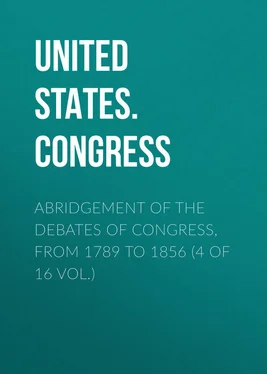United States. Congress - Abridgement of the Debates of Congress, from 1789 to 1856 (4 of 16 vol.)
Здесь есть возможность читать онлайн «United States. Congress - Abridgement of the Debates of Congress, from 1789 to 1856 (4 of 16 vol.)» — ознакомительный отрывок электронной книги совершенно бесплатно, а после прочтения отрывка купить полную версию. В некоторых случаях можно слушать аудио, скачать через торрент в формате fb2 и присутствует краткое содержание. Жанр: Политика, foreign_edu, на английском языке. Описание произведения, (предисловие) а так же отзывы посетителей доступны на портале библиотеки ЛибКат.
- Название:Abridgement of the Debates of Congress, from 1789 to 1856 (4 of 16 vol.)
- Автор:
- Жанр:
- Год:неизвестен
- ISBN:нет данных
- Рейтинг книги:3 / 5. Голосов: 1
-
Избранное:Добавить в избранное
- Отзывы:
-
Ваша оценка:
- 60
- 1
- 2
- 3
- 4
- 5
Abridgement of the Debates of Congress, from 1789 to 1856 (4 of 16 vol.): краткое содержание, описание и аннотация
Предлагаем к чтению аннотацию, описание, краткое содержание или предисловие (зависит от того, что написал сам автор книги «Abridgement of the Debates of Congress, from 1789 to 1856 (4 of 16 vol.)»). Если вы не нашли необходимую информацию о книге — напишите в комментариях, мы постараемся отыскать её.
Abridgement of the Debates of Congress, from 1789 to 1856 (4 of 16 vol.) — читать онлайн ознакомительный отрывок
Ниже представлен текст книги, разбитый по страницам. Система сохранения места последней прочитанной страницы, позволяет с удобством читать онлайн бесплатно книгу «Abridgement of the Debates of Congress, from 1789 to 1856 (4 of 16 vol.)», без необходимости каждый раз заново искать на чём Вы остановились. Поставьте закладку, и сможете в любой момент перейти на страницу, на которой закончили чтение.
Интервал:
Закладка:
But, sir, if Mr. Jackson had then known, as well as he now does, the dignified character, the high sensibility, and the correct intelligence of the Secretary of State, he would have found it more honorable to himself to have spared his insult altogether, or at least might have spared himself the trouble of underscoring. Sir, I conceive this insult so gross and outrageous that I am surprised how the Executive Government could reconcile it to itself to proceed another step in the communications with Mr. Jackson. Certainly, sir, proceeding beyond this point manifests on the part of the Executive great moderation, great forbearance, and a condescension scarcely excusable; and, sir, I am perfectly sure, that nothing could have induced it to consider such gross intimations argumentatively, but the ardent and sincere desire which has invariably actuated the present, as well as the last, Administration to preserve peace and cultivate harmony and a good understanding with Great Britain. And, sir, we shall see, in the course of this investigation, how it has been requited for this, as well as for all former acts of moderation, forbearance, and condescension.
Let me now, sir, select out of the quotation another extraordinary expression, for a few animadversions, in the following words: "But the very act of substitution evidently shows that those original conditions were in fact very explicitly communicated to you, and by you, of course, laid before the President for his consideration."
It is somewhat curious to observe what stress Mr. Jackson placed through the whole of his correspondence, upon what he is here pleased to term "the very act of substitution," and demonstrates to every impartial mind how slender are the pretexts with which Mr. Jackson is furnished, to apologize for, or rather to equivocate about the disavowal of Mr. Erskine's arrangement. Let me, therefore, inquire, in what this horrible act of substitution, as Mr. Jackson would make it appear, consists? Why, sir, simply in this: That the three inadmissible conditions mentioned in one of the despatches to Mr. Erskine, were verbally communicated to Mr. Smith, and insisted upon by Mr. Erskine, and that Mr. Smith, in rejecting those conditions verbally, and with great propriety and frankness, told Mr. Erskine what conditions he might obtain. Mr. Erskine, upon a review of all his letters of instructions, finding it impossible to obtain his, the three conditions first proposed, conceived himself fully empowered to propose those which possibly might have been intimated to him by Mr. Smith in conversation; and the arrangement was accordingly and promptly made between these two gentlemen on the part of their respective Governments. And now let me ask you, sir, what is there dishonorable, unfair, or even unusual in this proceeding, which is the whole amount of Mr. Jackson's "very act of substitution." Sir, it is very easy to see, that Mr. Jackson keeps his ingenuity constantly upon the stretch respecting this very act of substitution, evidently with a view of producing an impression by the insinuation, that the Executive Government of the United States had more than its share in that arrangement, and, in fact, was concerned in a dishonorable and scandalous combination with his predecessor, Mr. Erskine, for the purpose of producing the arrangement. Which insinuation, if true, must represent Mr. Erskine as a fool, a knave, or a traitor, or all three, and our Executive Government still further lost to every honorable sentiment, and utterly destitute of even the most ordinary understanding. An insinuation so insidious and affronting, cannot fail to excite the indignation and contempt of every patriotic heart in America. But, fortunately for the Executive Government, Mr. Erskine's previous explanation of this point to our Government strips the transaction of every shadow of a shade of a doubt, of which Mr. Jackson perhaps was not apprised at the time he was employed in devising the gross insinuation. Yes, sir, this was one miserable effort of Mr. Jackson to reproach our Executive Government for an act, for which it merited, and universally received, the sincere applause and grateful thanks of the American people. It restored the Executive, as it ought to have done, to universal confidence, and utterly rooted out every doubt of its sincerity in its diplomatic intercourse with Great Britain, under which some of our misled and mistaken citizens, for a while, unfortunately labored. For the moment terms were proposed on the part of Great Britain, which could, with honor or propriety, be accepted by the United States: they were frankly and promptly accepted by the Executive, regardless of all consequences from any other quarter. Sir, there is another part of this quotation which requires a few animadversions.
I allude, sir, to the first solemn declaration made to this Government by Mr. Jackson, respecting the despatch, in which the conditions were prescribed to Mr. Erskine. It is in the following words:
[Here Mr. Giles read the paragraphs from Mr. Jackson's letter, which charged that Mr. Erskine had shown to Mr. Smith, Secretary of State, the inadmissible conditions laid down in Mr. Canning's despatch; and then read Mr. Erskine's statement that he had not shown that part of Mr. Canning's despatch, and giving the reason why he had not done it.]
It is to be observed from this quotation, in the first place, sir, that Mr. Erskine explicitly disavows ever having shown the Executive Government the despatch containing the inadmissible conditions; and thus entirely exculpates it from the odious imputation attempted to be thrown on it by Mr. Jackson, and for this respectful forbearance to our Government, he is certainly entitled to the applause of his own. In the next place, Mr. Erskine explicitly states that the despatch in question contained but one part of his instructions, and that he thought that, from the spirit at least of his several letters of instructions, he was fully authorized to make the arrangement he had done. And I think there is very little doubt but he had – that Mr. Erskine still thinks so, there can be no doubt – for he nowhere says he is now convinced that his powers were incompetent – he only says, that the disavowal by His Majesty is a painful proof to him, that he had formed an erroneous judgment of His Majesty's views and the intentions of his instructions. Whether or not he had formed an erroneous view of His Majesty's views, or the intention of his instructions, I imagine, will depend very much upon the point of time to which the judgment he had formed is referable. If it be referred to the time of Mr. Oakley's mission, I am inclined to think he had neither formed an erroneous judgment of His Majesty's views, nor the intentions of his instructions; but, if he refers to the time of the disavowal, then I think it pretty certain, he had formed an erroneous judgment of both – for I have no doubt but His Majesty's views at least had completely changed between these two periods of time, and the real cause of this change, and of the disavowal itself, is to be looked for in the occurrences which took place, both in Europe and in the United States, during that interval. No, sir, the want of powers on the part of Mr. Erskine is not the true cause of the disavowal. I will now venture to conjecture the true cause, and, if it be the right one, the case will be a plain one, and all equivocations in the explanations rendered unnecessary. To do this, sir, I must call your attention to the state of events in Europe and in the United States, at these different periods of time. Mr. Oakley's mission was immediately after the British Government was apprised of the precipitate retreat of Sir John Moore's army from Spain, and the fortune escape of the remains of it from Corunna. The affairs of Spain, which had before excited such high expectations in the British Cabinet, were given up as hopeless, &c. Contemporaneously with a knowledge of these events, the British Government was also informed of the measures of resistance against her outrageous aggressions, contemplated by Congress; which she then believed would certainly be carried into effect, &c. Such was the state of things at the time of sending the despatches by Mr. Oakley. At the time of the disavowal, a new coalition had been formed, Austria had boldly entered into the war against France, and the Spaniards had been animated into further efforts at resistance, which excited new hopes of success, &c.
Читать дальшеИнтервал:
Закладка:
Похожие книги на «Abridgement of the Debates of Congress, from 1789 to 1856 (4 of 16 vol.)»
Представляем Вашему вниманию похожие книги на «Abridgement of the Debates of Congress, from 1789 to 1856 (4 of 16 vol.)» списком для выбора. Мы отобрали схожую по названию и смыслу литературу в надежде предоставить читателям больше вариантов отыскать новые, интересные, ещё непрочитанные произведения.
Обсуждение, отзывы о книге «Abridgement of the Debates of Congress, from 1789 to 1856 (4 of 16 vol.)» и просто собственные мнения читателей. Оставьте ваши комментарии, напишите, что Вы думаете о произведении, его смысле или главных героях. Укажите что конкретно понравилось, а что нет, и почему Вы так считаете.












